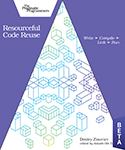|
February 23, 2021
Do you find yourself constantly reinventing the wheel? Do you ever struggle with the best application of the DRY principle? Do you have ready-made code from past projects that you just can't figure out how to bring into your current work? Don't worry, you're not alone.
In this latest addition to the Pragmatic Answers series, we'll get down to business and show you the solution fast so that you can get back to programming even faster!
Resourceful Code Reuse: Write → Compile → Link → Run

Get ready to take a deep dive into Python and C while learning to avoid the drawbacks and harness the benefits associated with seven common code reuse models. In no time at all, you'll develop the confidence to reuse code at any stage of real-world development.
This one-stop solution covers the complete build cycle: editing, compiling, linking, and running a ready program. Apply Linux/macOS power software development tools, such as ld, ldd, ranlib, and nm, to construct and explore state-of-the-art function libraries in C that could be linked with application-specific code either permanently or for the duration of execution. Learn why Python has modules for reuse and how they differ from C object files and libraries. Understand the risks and other negative implications of sharing and reuse. As a bonus, distill the dependencies between your project's components and automate and optimize your build process with the "make" utility.
Whether you are an amateur coder or an experienced developer, become a more productive and resourceful programmer by reusing previously written code.
Now available in beta from pragprog.com/titles/dzreuse.
You Could Be a Published Author
Is there a tech topic you are deeply passionate about and want to share with the rest of us? You could become a published Pragmatic Bookshelf author! Take a look at our pragprog.com/become-an-author page for details, including our 50% royalty (yes, for real!) and world-class development editors.
Remember, the best way to tell the future is to create it.
Upcoming Author Appearances2021-02-24 Johanna Rothman,
PMI SF Bay Area
2021-03-04 Johanna Rothman,
Agile New England
2021-03-10 Frances Buontempo,
ACCU Conf 2021
2021-03-10 Sophie DeBenedetto,
Code BEAM V Americas
Don't Get Left Out
Are your friends jealous that you get these spiffy email newsletters and they don't? Clue them in that all they need to do is signup at pragprog.com.
Tell your friends! Tweet this
Follow us on Twitter for the latest news, commentary, and occasional discounts: @pragprog, Andy Hunt @PragmaticAndy.
Thanks for your continued support.
By Professional Developers, for Professional Developers
PragProg.com
Sent by the Pragmatic Programmers, LLC. • 9650 Strickland Rd Ste 103-255• Raleigh NC 27615
|







